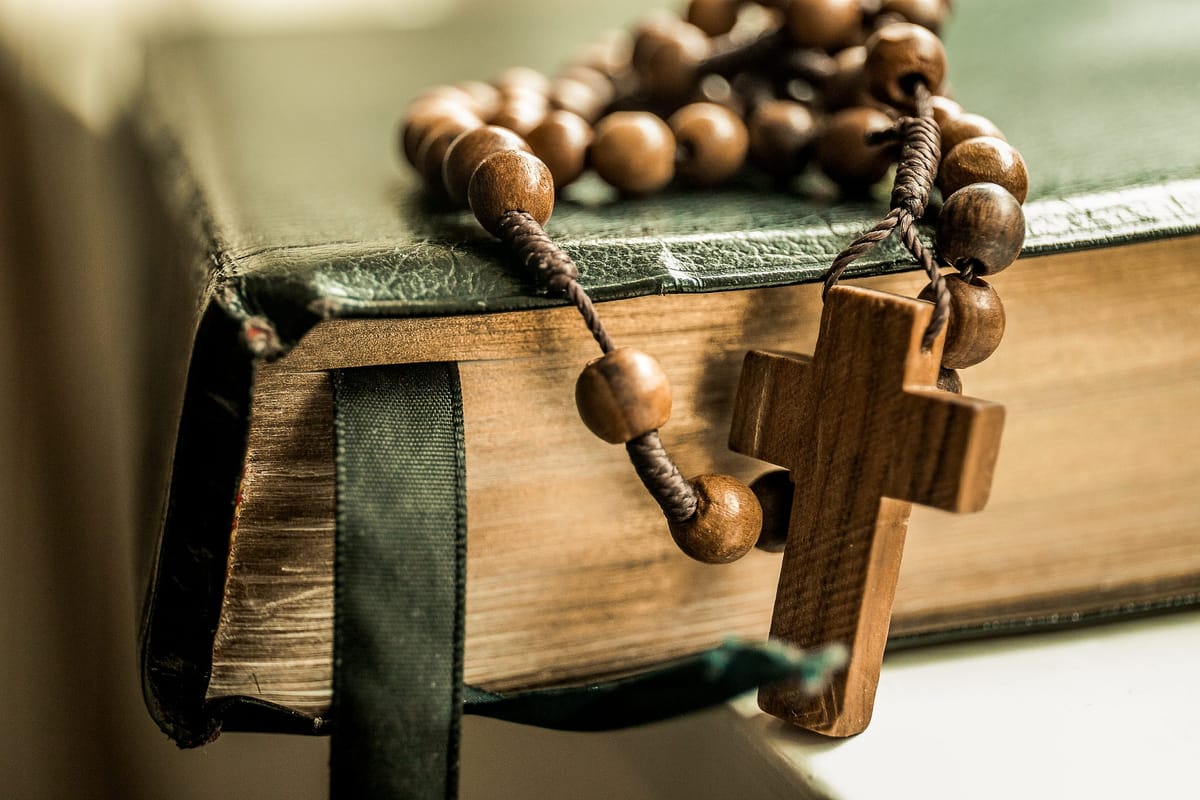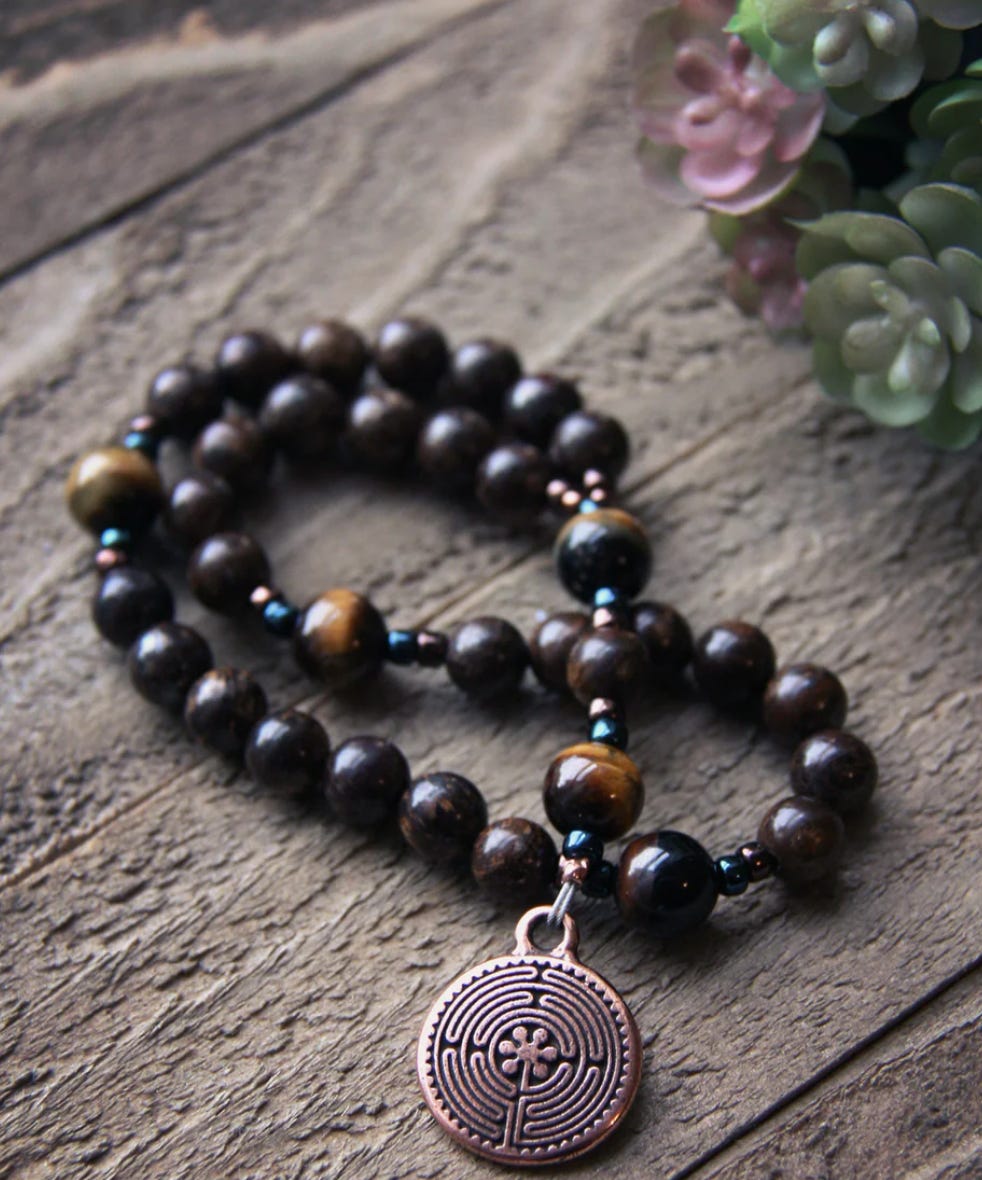Prayer Beads and Working Through Worship Trauma

For many Christians worldwide, a new year brings a new vigor to take their faith seriously. Taking one's faith seriously usually means a commitment to spiritual practices or "spiritual disciplines" for the more evangelical among us.
It's common for believers to loop in spiritual practices like going to church more consistently, reading their bible, praying, and committing to some form of intentional evangelism or do-gooding. In all likelihood, some of you reading this article are processing through or have recently wrapped up making commitments to practices meant to increase your faith this year.
For those of you who have made commitments, good on you. I genuinely wish you the best in your endeavors this year. For those, like me, who find themselves barely hanging on to their faith most days and count it a win when you don't throw your hands in the air and exclaim, "screw it, I'm done with this," I understand how daunting just the thought of committing to anything spiritual feels.
Instead of writing some "ra-ra, let's commit 2024 to Jesus" or over-hyped spiritual cheer. I'm going to be honest with where I am right now. I haven't prayed in over a year, but I'm finding some help using prayer beads. At the same time, I'm still full-on experiencing emotional trauma when hearing specific styles of Christian music.
Prayer Beads
Since attending the Catholic church as a young boy, I've always found rosaries intriguing. My interest has had nothing to do with understanding their spiritual purpose. In my eyes, rosaries meant the person who possessed them took faith seriously and had some mystic connection with God. Having spent most of my Christian years in evangelical circles, my interest in rosaries was never explored.
Prayer as an evangelical is a top three spiritual discipline with acronyms (ACTS, adoration, confession, thanksgiving, supplication) to help guide the prayer into a deep spiritual conversation with God. When I'm in a much healthier spiritual place, most of my prayers are filled with half-thoughts, repetitive statements, and bouts of dozing off. Being on a spiritual lifeline has meant that even thinking about prayer generally comes with the idea, "What's the point?" preventing me from starting.
I don't know what it is, but I've sporadically thought of praying for others or circumstances over the last few weeks. For reasons I can't explain, I've been feeling an internal tug to reach out to God and say something...anything.
There are no false illusions where I see myself as a mystic of profound faith. However, I have started using Anglican prayer beads to help me step toward prayer. Before using the prayer beads, I had to learn how they worked, what to pray, or if there were specific prayers I was supposed to pray. I'm a novice and inconsistent, but here's what I've learned thus far.
My Prayer Beads and Prayer Rhythm
Below is a picture of the beads I bought, and here is a link to Unspoken Elements, where I bought them. Unspoken Elements was recommended to me by my priest, so you can trust the site; it's Reverand Reagan-approved. 😉

- Beads consist of a charm, four cruciform beads (bigger beads), and four groups of seven smaller beads called 'weeks.'
- Starting at the cross (or whatever your charm is, mine is a labyrinth), I pray, "O God, make speed to save us, O Lord, make haste to help us."
- Moving to the invitatory bead (the first big bead and separate from the four cruciform beads), I pray, "Glory to the Father, and to the Son, and to the Holy Spirit: As it was in the beginning, is now, and will be forever. Amen"
- At the first three cruciform beads, I pray the Lord's Prayer using Matthew 6:9-13.
- For each week, I pray the short form of the Serenity Prayer (yes, the prayer from Alcoholics Anonymous):
"God grant me the Serenity
To accept the things I cannot change,
Courage to change the things I can,
And the Wisdom to know the difference."
- At the last cruciform bead, I pray, "Let us bless the Lord, thanks be to God."
- Finally, when returning to the cross (or charm), I close by praying, "The almighty and merciful Lord, Father (Mother), Son and Holy Spirit bless us and keep us. Amen."
In total, it takes about 10-15 minutes to work through the beads, and especially if I control my breathing while working through the weeks, I feel calm when I'm done. Sometimes, I start but don't finish, and that's okay. Some prayer is better than no prayer. Sometimes, I just hold the beads and pray the Jesus Prayer repeatedly, "Lord, Jesus Christ, Son of God, have mercy on me."
The hardest part of using prayer beads has been getting over using ancient prayers instead of my own words. I'm not sure why, but using ancient, time-tested prayers in evangelical circles is looked down upon as some "lesser" or "lazy" way to pray. Once I push back those lingering thoughts, I find deep comfort in knowing I have the words of the saints to help me pray because I don't have the words on my own. Candidly, even when I think I have the words, they often fail me or feel hollow.
Worship Trauma
Old school hymns and a choir have been a healing balm to my soul when it comes to worshiping God musically. Since sometime around 2017, I have had difficulty taking any CCM (Contemporary Christian Music) seriously. While working at a mega-church at the time, a worship leader friend confided in me what became a crisis of faith. A significant trigger for his crisis was seeing week after week how "the Spirit moving" during worship had more to do with the notes the band was playing than anything supernatural or spiritual.
Since leaving pastoral ministry in early 2022, I cannot listen to a CCM song (think Hillsong, Bethel, anything you would find on Christian radio, etc.) without feeling some combination of depression, anger, and manipulation.
To my family and myself, CCM (this also includes CHH Christian Hip Hop) has come to represent the consumerist, self-glorifying, narcissistic, and toxic celebrity Christianity that is the evangelical church.
It's wild how a style of music can embody all the superficial and harmful behaviors of a movement, but for my family and me, it does. We've encountered folks who think we're blowing things out of proportion and use hyperbole to describe our visceral reaction to this music.
The truth is, I've had to walk out of church services because one of my kids was triggered by a song that made their heart race, mouth dry, and feel like the room was shrinking. Trauma sucks; spiritual trauma really sucks.
I am still trying to figure out an answer on how we move past this or if it's something we'll ever move past. I know that one part of me is using prayer beads to try to jump-start something resembling prayer, while another part of me feels like a lion is at my window when a specific style of music is played for worship. This is a mess, I'm a mess, but this is where I am. I don't have a ra-ra spiritual resolution to fix me, but I'm willing to face reality and am learning to be okay with sitting in the spiritual tension.
In the wisdom of the Foo Fighters, I think, "It's times like these we learn to live again."

Until next time, peace and freedom to the world, friends. 🙏🏼✌🏼🌎




